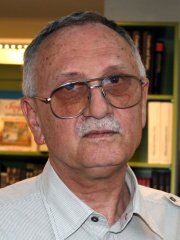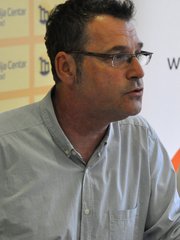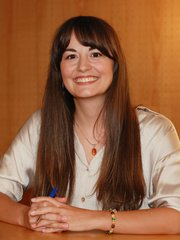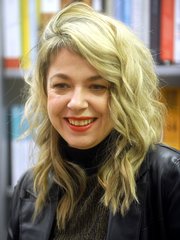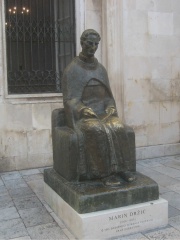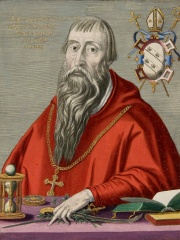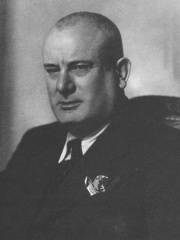
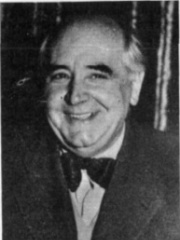
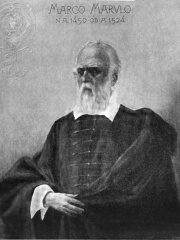
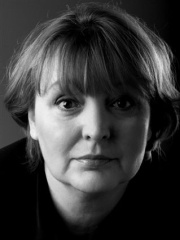
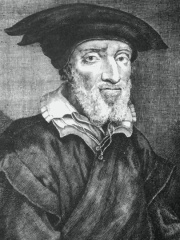
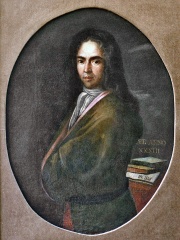
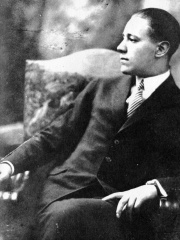

The Most Famous
WRITERS from Croatia
Top 10
The following people are considered by Pantheon to be the top 10 most legendary Croatian Writers of all time. This list of famous Croatian Writers is sorted by HPI (Historical Popularity Index), a metric that aggregates information on a biography's online popularity. Visit the rankings page to view the entire list of Croatian Writers.

1. Frano Selak (1929 - 2016)
With an HPI of 70.77, Frano Selak is the most famous Croatian Writer. His biography has been translated into 21 different languages on wikipedia.
Frano Selak or Frane Selak (14 June 1929 – 30 November 2016) was a Croatian music teacher, who was best known for his unverified stories about frequent brushes with death.

2. Miroslav Krleža (1893 - 1981)
With an HPI of 69.25, Miroslav Krleža is the 2nd most famous Croatian Writer. His biography has been translated into 37 different languages.
Miroslav Krleža (pronounced [mǐrɔ̝slav̞ kř̩le̞ʒa]; 7 July 1893 – 29 December 1981) was a Croatian writer who is widely considered to be the greatest Croatian writer of the 20th century. He wrote notable works in all the literary genres, including poetry (The Ballads of Petrica Kerempuh, 1936), theater (Messrs. Glembay, 1929), short stories (The Croatian God Mars, 1922), novels (The Return of Philip Latinowicz, 1932; On the Edge of Reason, 1938), and an intimate diary. His works often include themes of bourgeois hypocrisy and conformism in Austria-Hungary and the Kingdom of Yugoslavia. Krleža wrote numerous essays on problems of art, history, politics, literature, philosophy, and military strategy, and was known as one of the great polemicists of the century. His style combines visionary poetic language and sarcasm. Krleža dominated the cultural life of Croatia and Yugoslavia for half a century. A "Communist of his own making", he was criticized in Communist circles in the 1930s for his refusal to submit to the tenets of socialist realism. After the Second World War, he held various cultural posts in Socialist Yugoslavia, and was most notably the director of the Yugoslav Lexicographical Institute and a constant advisor on cultural affairs to President Tito. After the break with Stalin, his speech at the 1952 Congress of Yugoslav Writers signaled a new era of comparative freedom in Yugoslav literature.

3. Marko Marulić (1450 - 1524)
With an HPI of 67.81, Marko Marulić is the 3rd most famous Croatian Writer. His biography has been translated into 31 different languages.
Marko Marulić Splićanin (pronounced [mâːrko mǎrulitɕ splîtɕanin]; Latin: Marcus Marulus Spalatensis; 18 August 1450 – 5 January 1524) was a Croatian poet, lawyer, judge, and Renaissance humanist. He is the national poet of Croatia. According to George J. Gutsche, Marulić's epic poem Judita "is the first long poem in Croatian", and "gives Marulić a position in his own literature comparable to Dante in Italian literature." Marulić's Latin poetry is of such high quality that his contemporaries dubbed him "The Christian Virgil." He has been called the "crown of the Croatian medieval age", the "father of the Croatian Renaissance", and "The Father of Croatian literature." Marulić scholar Bratislav Lučin notes that he was well-versed in both the Christian Bible and in the Fathers of the Church. At the same time, Marulić also attentively read the Pre-Christian Greek and Latin Classics. He read and interpreted Latin epigrams, wrote glosses on the erotic poetry of Catullus, read Petronius' Satyricon, and admired Erasmus of Rotterdam. Marulić also composed humanist elegies, satirical poetry, erotic epigrams inspired by Ovid, and Latin Christian poetry inspired not only by the epics of Homer and Virgil, but also by Lucan, Statius, Faltonia Betitia Proba, Juvencus, Venantius Fortunatus, Cyprianus Gallus, Coelius Sedulius, and many other both Pagan and Christian writers in the same language. According to Franz Posset, Marulić aspired to the Renaissance humanist ideal of the uomo universale ("universal man"). To this end, he was interested in painting and drawing, local and national history, languages, and poetry. His overall goal always remained renovatio Christiana ("The Renewal of Christianity") as represented by the future Counter-Reformation. Accordingly, like many other Renaissance humanists who shared his views, Marulić denounced simony and immorality among Catholic priests and members of the hierarchy in often violent language throughout his writings. Although Marulić and Martin Luther lived at the same time and were published by two of the same Basel printers, their collected writings make no mention of each other. In the absence of evidence to the contrary, it must be assumed that both theologians were simply unaware of the other's existence. At the same time, both men shared a common belief in Evangelica Veritas ("Gospel Truth") and "theology for piety". They both built their differing theology upon the similar training they received in scholasticism, Renaissance humanism, and Devotio Moderna. Like fellow Renaissance humanists Johann Reuchlin, Erasmus of Rotterdam, Thomas More, John Fisher, Juan Luis Vives, and Paolo Riccio, however, Marko Marulić remained committed to an internal renewal of Catholicism and loyal to the Holy See, while Martin Luther and his adherents did not. Marulić's work was admired both by many of the greatest and most influential Catholic saints of the Counter-Reformation and also, since much of Marulić could be read without violating sola scriptura, by generations of believers in Protestantism. His writings in Renaissance Latin, once adored and envied across Europe, shared the destiny that befell most Renaissance Humanist literature and faded into obscurity. According to Lučin, however, the passage of time has slowly revealed the important web of influence that the poet and writer wove all over Europe and far beyond its borders. Marulić's writings were admired by churchmen such as Saints Francis Xavier, Francis de Sales, Peter Canisius, and Charles Borromeo, by monarchs and statesmen such as King Henry VIII, Thomas More, and Emperor Charles V, emulated by poets like Jan Dantyszek, Conrad Peutinger, and Francisco de Quevedo, and translated into vernacular verse by still other poets; including Fray Luis de León, St Philipp Howard, Rhina Espaillat, and Edward Mulholland. Furthermore, manuscripts of Marulić works previously thought lost, such as his Christian epic poem the Davidiad in 1952, his Latin-Croatian literary translation of Thomas à Kempis' The Imitation of Christ in 1989, and the Glasgow Codex in 1995, continue to resurface and to belatedly see publication for the first time. One of Marulić's books published in the 1510s is also the first time a literary work used the term "psychology". More recently, Pope John Paul II quoted from a Marulić poem during his 1998 apostolic visit to Solin, Croatia.

4. Dubravka Ugrešić (1949 - 2023)
With an HPI of 67.62, Dubravka Ugrešić is the 4th most famous Croatian Writer. Her biography has been translated into 44 different languages.
Dubravka Ugrešić (Croatian: [dûbraːvka ûgreʃit͡ɕ]; 27 March 1949 – 17 March 2023) was a Yugoslav-Croatian and Dutch writer. A graduate of University of Zagreb, she was based in Amsterdam from 1996 and continued to identify as a Yugoslav writer.
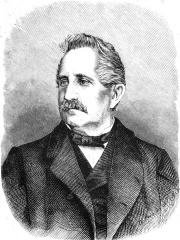
5. Ljudevit Gaj (1809 - 1872)
With an HPI of 66.99, Ljudevit Gaj is the 5th most famous Croatian Writer. His biography has been translated into 33 different languages.
Ljudevit Gaj (Croatian: [ʎûdeʋit ɡâːj]; born Ludwig Gay; Hungarian: Gáj Lajos; 8 August 1809 – 20 April 1872) was a Croatian linguist, politician, journalist and writer. He was one of the central figures of the pan-Slavist Illyrian movement.

6. Matthias Flacius (1520 - 1575)
With an HPI of 66.91, Matthias Flacius is the 6th most famous Croatian Writer. His biography has been translated into 28 different languages.
Matthias Flacius Illyricus (Latin; Croatian: Matija Vlačić Ilirik) or Francovich (Croatian: Franković) (3 March 1520 – 11 March 1575) was a Lutheran reformer from Istria, present-day Croatia. He was notable as a theologian, sometimes dissenting strongly with his fellow Lutherans, and as a scholar for his editorial work on the Magdeburg Centuries.

7. Ivan Gundulić (1589 - 1638)
With an HPI of 66.48, Ivan Gundulić is the 7th most famous Croatian Writer. His biography has been translated into 30 different languages.
Dživo Franov Gundulić (Italian: Gianfrancesco Gondola; 8 January 1589 – 8 December 1638), better known today as Ivan Gundulić, was the most prominent Baroque poet from the Republic of Ragusa (now in Croatia). He is regarded as the Croatian national poet. His work embodies central characteristics of Roman Catholic Counter-Reformation: religious fervor, insistence on "vanity of this world" and zeal in opposition to "infidels". Gundulić's major works—the epic poem Osman, the pastoral play Dubravka, and the religious poem Tears of the Prodigal Son (based on the Parable of the Prodigal Son)—are examples of Baroque stylistic richness and, frequently, rhetorical excess.

8. Ödön von Horváth (1901 - 1938)
With an HPI of 64.95, Ödön von Horváth is the 8th most famous Croatian Writer. His biography has been translated into 39 different languages.
Edmund Josef von Horváth (9 December 1901 – 1 June 1938) was an Austro-Hungarian playwright and novelist who wrote in German, and went by the nom de plume Ödön von Horváth (German pronunciation: [ˈøːdœn fɔn ˈhɔʁvaːt]). He was one of the most critically admired writers of his generation prior to his untimely death. He enjoyed a series of successes on the stage with socially poignant and romantic plays, including Revolte auf Côte 3018 (1927), Sladek (1929), Italienische Nacht (1930), Hin und Her (1934), and Der Jüngste Tag (1937). His novels include Der ewige Spießer (1930), Ein Kind unserer Zeit (1938), and Jugend ohne Gott (1937).

9. Petar Zrinski (1621 - 1671)
With an HPI of 64.61, Petar Zrinski is the 9th most famous Croatian Writer. His biography has been translated into 18 different languages.
Petar IV Zrinski (Hungarian: Zrínyi Péter) (6 June 1621 – 30 April 1671) was Ban of Croatia (Viceroy) from 1665 to 1670, general and a writer. A member of the Zrinski noble family, he was noted for his role in the attempted Croatian-Hungarian Magnate conspiracy to overthrow the Habsburgs, which ultimately led to his execution for high treason.
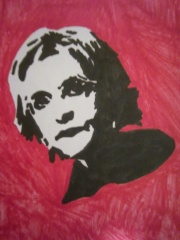
10. Slavenka Drakulić (b. 1949)
With an HPI of 63.97, Slavenka Drakulić is the 10th most famous Croatian Writer. Her biography has been translated into 35 different languages.
Slavenka Drakulić (born July 4, 1949) is a Croatian journalist, novelist, and essayist whose works on feminism, communism, and post-communism have been translated into many languages.
People
Pantheon has 45 people classified as Croatian writers born between 1332 and 1986. Of these 45, 7 (15.56%) of them are still alive today. The most famous living Croatian writers include Slavenka Drakulić, Pavao Pavličić, and Miro Gavran. The most famous deceased Croatian writers include Frano Selak, Miroslav Krleža, and Marko Marulić. As of April 2024, 3 new Croatian writers have been added to Pantheon including Vladimir Arsenijević, Lana Bastašić, and Ivana Bodrožić.
Living Croatian Writers
Go to all RankingsSlavenka Drakulić
1949 - Present
HPI: 63.97
Pavao Pavličić
1946 - Present
HPI: 52.86
Miro Gavran
1961 - Present
HPI: 47.97
Vladimir Arsenijević
1965 - Present
HPI: 44.64
Tanja Stupar-Trifunović
1977 - Present
HPI: 42.56
Lana Bastašić
1986 - Present
HPI: 40.69
Ivana Bodrožić
1982 - Present
HPI: 39.37
Deceased Croatian Writers
Go to all RankingsFrano Selak
1929 - 2016
HPI: 70.77
Miroslav Krleža
1893 - 1981
HPI: 69.25
Marko Marulić
1450 - 1524
HPI: 67.81
Dubravka Ugrešić
1949 - 2023
HPI: 67.62
Ljudevit Gaj
1809 - 1872
HPI: 66.99
Matthias Flacius
1520 - 1575
HPI: 66.91
Ivan Gundulić
1589 - 1638
HPI: 66.48
Ödön von Horváth
1901 - 1938
HPI: 64.95
Petar Zrinski
1621 - 1671
HPI: 64.61
Marin Držić
1508 - 1567
HPI: 63.32
Antun Vrančić
1504 - 1573
HPI: 63.11
Tin Ujević
1891 - 1955
HPI: 62.89
Newly Added Croatian Writers (2025)
Go to all RankingsVladimir Arsenijević
1965 - Present
HPI: 44.64
Lana Bastašić
1986 - Present
HPI: 40.69
Ivana Bodrožić
1982 - Present
HPI: 39.37
Overlapping Lives
Which Writers were alive at the same time? This visualization shows the lifespans of the 25 most globally memorable Writers since 1700.

